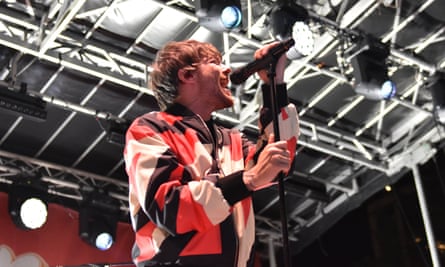In Kingston upon Thames last week, a group of teenage girls lay on the floor in sleeping bags and swathed in blankets in sub-zero temperatures. To the average passer-by, they might have appeared homeless. But those who saw the music venue a few yards away would have realised they were camping for a gig.
They were braving the cold to get to the front row of one of three sold-out, intimate gigs by former One Direction member Louis Tomlinson. But the group made headlines after the local record shop Banquet Records, the show’s promoter, sent them to the back of the queue the next morning, having warned that queuing overnight in freezing weather would not be allowed.
While some saw this as “punishing” passionate fans seeking a space at the front, others praised the shop for tackling “extreme” queueing behaviour. Camping out to secure your spot on the front row is traditional fan behaviour, but post-pandemic, queues are becoming longer as young music lovers hanker to make the most of in-person experiences.
Banquet’s actions, as well as stories about TikTok perpetuating “toxic” queueing culture and “stan” Twitter making shows less safe – in addition to heightened awareness of security around live music following the Astroworld disaster and loss of life at Asake’s recent London show – have raised questions about whether camping at gigs should continue.
“It wasn’t against camping culture – it was specifically against camping culture in minus four degrees,” says Jon Tolley, who runs Banquet. “We put on 300 gigs a year and some are big names who attract people who camp. I’ve seen the camaraderie and I see how fun it is, but there have to be repercussions. Safeguarding is critical.
“We are a brand and if people can’t trust us, they’ll go somewhere else. That’s not only customers, it’s also artists.”
These measures seem logical – yet few venues and promoters enforce rules around queueing overnight, or sometimes for days. Angelo Franklin, operations director at London-based Triangle Security, says managing queues is “very much venue-dependent”.
“It’s not really possible to enforce any [rules] early on because we have no authority. The people queueing sometimes do not have tickets yet, so they can claim they are just hanging around.” To ensure safety, Franklin and his team research an event online in advance to gauge queue sizes.
Keeping an “orderly queueing system” is a challenge, he adds – although many fans tend to manage this themselves – in addition to “ensuring there are no queue jumpers or fans harassed by ticket touts.”
With so much at stake – dangerous conditions, extreme weather, competition from others – is “operation barrier”, as the mission to make the front row is known, really worth it? “You form a bond with people around you, you sing songs and play games and it hypes you up for the gig,” says Manuela Biondi from Rome, who arrived at 8am to see Louis Tomlinson in Kingston.
One Tomlinson fan, Jaz David, spent nine days queueing for his show in Spain this year. “I do it primarily for the view but camping for the show can be just as fun, if not more so, than the show itself. That’s where I’ve met most of my friends.”
The connections that form when queueing are an undeniable draw for fans. As Hannah Ewens observes of the community among strangers in one such queue in her book Fangirls: Scenes from Modern Music Culture: “The waiting connects the public and private parts of fandom.”
The proximity to artists is also enticing. “The only thing between you and the artist is the barricade,” says Michelle Evangelista, a New York City-based fan who spent her teenage years queueing to see One Direction.
Yumie Regatieri from Milton Keynes once spent 12 hours in line to see Lorde: “When you are first row the chance of interacting with the artists is bigger and totally worth the queuing.”
But camping can be cumbersome to security and venue staff who often work irregular hours to monitor queues or pick up after fans who leave behind litter and discarded camping gear. It also creates inequality among gig-goers, Biondi admits: “If you queue really early, you are taking away the chance for someone else to be at the front who has school or work and cannot simply lose a number of days queueing.”
Even for those who do it, camping is admittedly “stressful and exhausting”, says Carolina Cuellar, who once travelled from Mexico City for a 32-hour wait to see Muse in London. “You get cold, you sleep uncomfortably and by the time the gig starts you’re so tired.”
Though music fans remain divided about camping culture, most welcome better and more consistent regulation of queues to ensure a fair fan experience. “I would love it if all venues had a wristband system that allows you to leave and come back when the doors open with your number,” says Cuellar. “I liked what Banquet did: it was a great way to show that people must follow the rules.”

